How "Red" is Little Red Book?
TikTokers fled to China's fluffy, politics-free answer to "Instagram". Yet behind the scenes, Xiaohongshu is being increasingly coopted by the CPC.

A lot has been written on REDNote, née Little Red Book, or Xiaohongshu this past week. One vital question has been missed in all the coverage though: just how ‘red’ is it?
Xiaohongshu is unusual among the internet. Of its 300 million users, 70 percent are female, and 85 percent Gen Z-or-younger. Users are wealthier, often from China’s Eastern provinces. Its reputation is one for loveliness. For many, the platform offers a safe space to browse fashion, share travel tips, and indulge in personal stories. Comments are unusually supportive.
If there was ever going to be any an easy landing for TikTok refugees on a Chinese platform, Xiaohongshu is probably the softest of pillows.
However, scratch beneath its liberal bourgeois base and you’ll find Xiaohongshu — the firm — actually has a red belly, and increasingly political aims.
In recent years, the Communist Party has made strategic inroads to the company, which, coincidentally, has coincided in the app’s stratospheric rise, from 100 million users in 2018, to 300 million users today; a funding round that valued it at $17 billion in Summer 2024, making it one of the world’s most valuable unicorns; and to last week’s unexpected ‘Going Global’ event, where it topped the app download charts in 87 countries.
In many ways, Xiaohongshu reflects the wider politicization that is taking place under Xi’s China.
This, then, is the story of how RED became red.
‘Practice the core values of socialism’
Open any western report, and it’s likely you heard the factoid that Xiaohongshu, means ‘Little Red Book’, which is a tongue-in-cheek reference to Chairman Mao’s Little Book of Quotations.
In fact, this is misnomer. The firm denies it. Xiaohongshu’s creator Mao Wenchao says the name is actually a homage to the red colours of Bain Capital and Stanford University, which he fondly attended.
But to find actual socialist leanings, you needn’t dig far.
Take the “Xiaohongshu Community Standards” — the terms and conditions that every user has to agree to, on signing up to the app. For foreign applicants, this is a step harder, as they’re only available in Mandarin. That’s because they were only meant for the Chinese market, and Chinese sensibilities.
Xiaohongshu says the aim of these regulations is to shape “content that is in line with the mainstream values of contemporary society”.
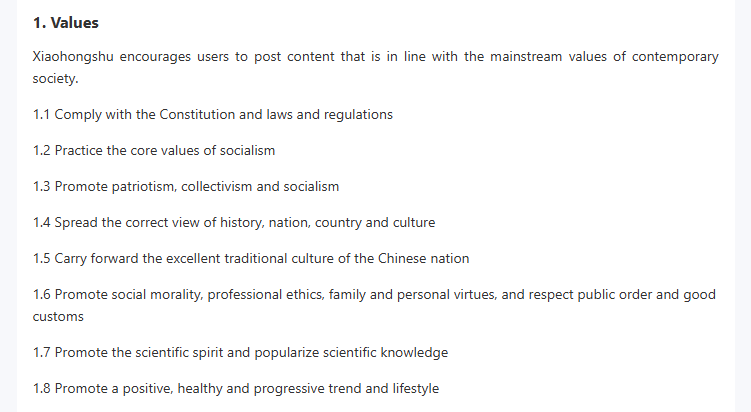
I’m not sure how many “TikTok refugees” searching for a place to continue their “free speech” realised they were agreeing to “practice the core values of socialism”. Nor to “promote patriotism”.
There’s also a deep fustiness to some of the rules. “Posting content that contains uncivilized behavior, such as smoking in non-smoking areas,” is oddly specific.
Squint, and you might recognise many of these rules are simply an edited version of those of the Communist Party of China Constitution. That’s because they are.
“Spread the correct view of history” is a rule that can only be understood after 15 years of carefully hammered PRC education. I.e., China didn’t fight in the Korean War it sent ‘volunteers’ to the “The War to Resist US Aggression and Aid Korea”. For the Chinese public, this is elementary ABC. For foreign nationals, these are landmines waiting to be triggered.
In this cultural confusion, foreign users have already started to fall foul. Multiple bans have already been handed down — not just to attention-seekers looking for them for clout, but to everyday users with no idea what they’re guilty of.
But how did these values come about? Time to go behind the scenes.
Putting the ‘red’, into Little Red Book
On April 18, 2019, the first Communist Party branch was set up inside Xiaohongshu. It was a small, but important affair. Speeches were made by officials from the local Party Branch. One presented books and flags.
Co-founder Zeng Xiulian was the first Party Secretary. “The establishment of the party organization is of great significance to Xiaohongshu,” she said in her speech. “Moving in the direction guided by the Communist Party of China will help…inject new vitality into the development of the enterprise.”
The event was reported by Yijian Finance at the time: “In addition to enhancing its credibility in Party media, Xiaohongshu also established a party committee and actively moved closer to the Party,” it said.
If you’re wondering why it took six years for the firm to form a Party cell, perhaps a clue is given in the article. Around this time, the Xiaohongshu is alleged to have garnered negative publicity over user data, and a proliferation of black market beauty products on the app. Xiaohongshu is carrying out a “comprehensive investigation, rectification, and in-depth self-examination and self-correction", the article says.
“Hehe, this is emergency public relations,” a netizen points out in the comments.
This wasn’t the first attention the firm had with the Party. Thanks to its explosive growth, it had long been a darling.
In September 2015, then Premier Li Keqiang visited Xiaohongshu’s factory in Henan. "I hope you will become an innovative enterprise that is at the forefront of the country in this field," he told workers.
Then in July 2016, Vice Premier Wang Yang inspected Xiaohongshu's Shanghai headquarters and said: "Do something that is very meaningful to the country and the people, and make your life very valuable!"
From one just group, the Party inside Xiaohongshu grew quickly. By 2024, the firm boasted at least four active Communist Party cells, with “nearly 200 members”.
These groups aren’t just passive either. Work ranges from benign activities like learning patriotic poetry, charity fundraising, Covid response, and running a pet celebration week. Most energy, though, is reserved for key political events.
“On the opening day of the conference, the Party Committee of Xiaohongshu Company organized all party members and content security practitioners to listen to and watch the opening ceremony of the 20th National Congress of the Communist Party of China in a centralized or online manner,” says a report by the local Party.
Staged photographs show staff watching President Xi Jinping’s speech. In one, a banner hangs behind them. It reads: “Don’t forget your original intention and keep your mission in mind! The Party Committee of Xiaohongshu.”
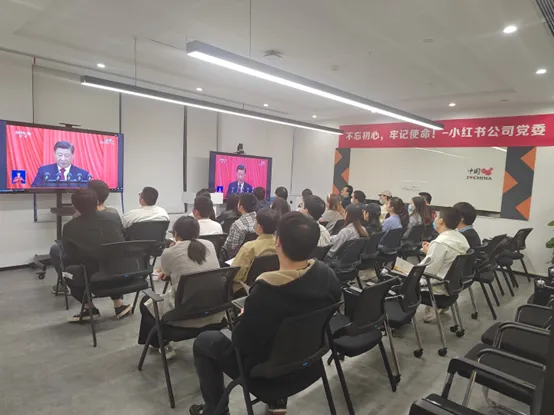
“Train key Party members to become managers”
The Party’ is surprisingly candid about its work inside Xiaohongshu, as a mini-lecture series created by the CPC Shanghai Huangpu District Committee and aimed at Xiaohongshu staff, helpfully shows.
In one video, titled “The “Red Engine” That Keeps Xiaohongshu Popular” host Wu Ruixuan, explains: “Xi Jinping pointed out that it is necessary to strengthen party building in social organizations and explore ways to strengthen party building in emerging industries and the Internet.”
“We must innovate Party-building platforms and activities to make young people follow the Party,” Wu adds, wearing her hammer & sickle pin.
In one illuminating section, labelled: “Optimize the training mechanism to help employees grow” she gives specific insight as to how the Party expands it numbers inside the firm.
Top management and Party management are inseparable. “Since its establishment, the company's party organization has always had a Partner as secretary,” a related article by the local Party branch says.
“At present, the first-level heads of important departments, including: the company's government affairs department, content security department, and security governance department are all formal party members.”
“Through the measures of key positions held by party members and backbones, the correct political direction is effectively guaranteed,” it triumphantly announces.
But how?
The Party explains a three pronged process, that can be surmised as schmoozing, grooming, and maneuvering, or as they write:
Cultivate backbone cadres into party members
Cultivate Party members into backbones
Train key Party members to become managers
When hiring staff, priority is given to Party members — a practice much suspected across China, but seldom admitted to in public.
“When recruiting personnel, the principle of giving priority to party members under the same conditions is implemented,” the article explains.
Once inside, Party members are shepherded up the ladder and into prime roles. From here, they are able to recruit and steward the careers of other younger cadres.
But how active are Party members once in these roles?
Remember Xiaohongshu’s Community Values? How they looked similar to the Communist Party Constitution? Meet Xiong Jian, General Manager of Government Affairs, Vice President and Deputy Chief-Editor. Essentially, he’s in charge of managing the app’s ‘vibe’ and making sure Xiaohongshu keeps in step thematically with China’s Government.
In 2022, he also became Party Secretary of the newly created Xiaohongshu Shanghai Committee. In his speech, he promised to “promote the integration of party building work with platform business and corporate culture.”
In fact, it can be hard to pull apart Xiong’s two roles, so synonymous and reactive are they to wider Government policies.
For example, concurrent with a national crackdown on “vulgar” content, in November 2020, Xiaohongshu had a 10 day campaign of its own, where it “deleted 1,054 illegal notes, and punished 207 related accounts” for "showing off wealth" and "vulgar soft pornography".
By 2022, the numbers soared: “Since last year, the company has fully implemented the responsibility system for network ideological work, launched the implementation of special governance work, and cleaned up 308,400 pieces of illegal and bad information, handled 233,300 accounts, and issued 17 relevant user guidance announcements.”
During, the 20th Congress, Xiaohongshu also ran a campaign to fit the wider national theme of "China in the Past Decade", which ran from state media downwards. App users were bombarded via “opening screen display, red pages, content collection, landing pages”. The store algorithm was also tweaked so that ‘patriotic products’ were bumped up the page.
The Political environment
None of this is new. It’s just rarely talked about outside of China.
It’s not easy being a tech firm in Xi’s “New Era”. The Party has an uneasy relationship with the free market. On one hand, liberalisation — first introduced under Deng Xiaoping — has led to explosive growth, and an exponential rise in living standards for most Chinese. On the other, it’s also created a series of power bases, and a rampant class of new mega-wealth.
In a country which constitutionally has only one “core”, that won’t do. Sometimes — as Jack Ma can attest — egos need to be brought to heel.
To this, the CPC has sought increasingly sought to ingratiate itself with private firms of late, co-opt them from the inside. In 2020, the CPC Central Committee called for “Strengthening the United Front Work of Private Economy in the New Era”, one of the core aims is:
Adhere to the Party's leadership over the united front work of the private economy, and always plan and promote the work from a political and overall perspective; and further enhance the Party's leadership and cohesion over private economic personnel.
But how much of the firm’s behaviour is actual zeal, and how much is demonstrative lip-service, self-preservation in an increasingly political environment under the Xi Jinping administration is entirely up for debate.
As anyone who’s sat through a staff meeting in China can attest, patriotic fervour isn’t exactly rampant — for proof, check some of the excited faces in the photos above. The vast amount of Party work in day-to-day life is performative, and largely career-focused.
But such are the potential consequences, these ‘Box-ticking obligations’ are handled especially seriously when firms are public facing, or handling mass communities — a trigger point for Beijing.
It’s unsurprising that the first reaction of Xiaohongshu to a wave of new users was to respond with haphazard bans, lockouts, censored posts, and emergency hires of new English language moderators. When traffic began to spike last week, I’m sure the first reaction in Xiaohongshu HQ was not excitement: but panic.
The hope is the firm or its regulator, the Central Cyberspace Affairs Commission, don’t overreact; that oblivious Western TikTokers haven’t brought too much political heat, before they inevitably grow bored and saunter back, to try and monetize themselves on a rejuvenated TikTok. Already, a number of Chinese nationalists (mostly older, male) voices have pointed at Xiaohongshu this week, calling it a shameless liberal hotbed, and ripe for educating.
Because to reiterate: for many, Xiaohongshu was a homely community — ask any Gen Alpha/Z/Millennial Chinese girl. And for young Chinese women, a space where they feel comfortable to be themselves, express their thoughts, and openly foster aspirations, is becoming an increasingly rare, precious place indeed.
To them, it’s a rare flower, growing from red earth.

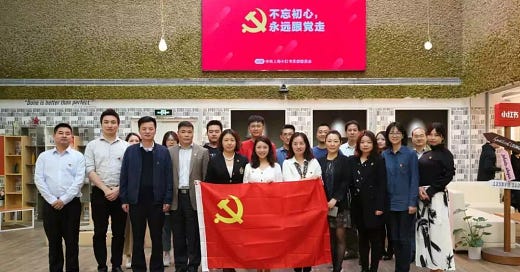


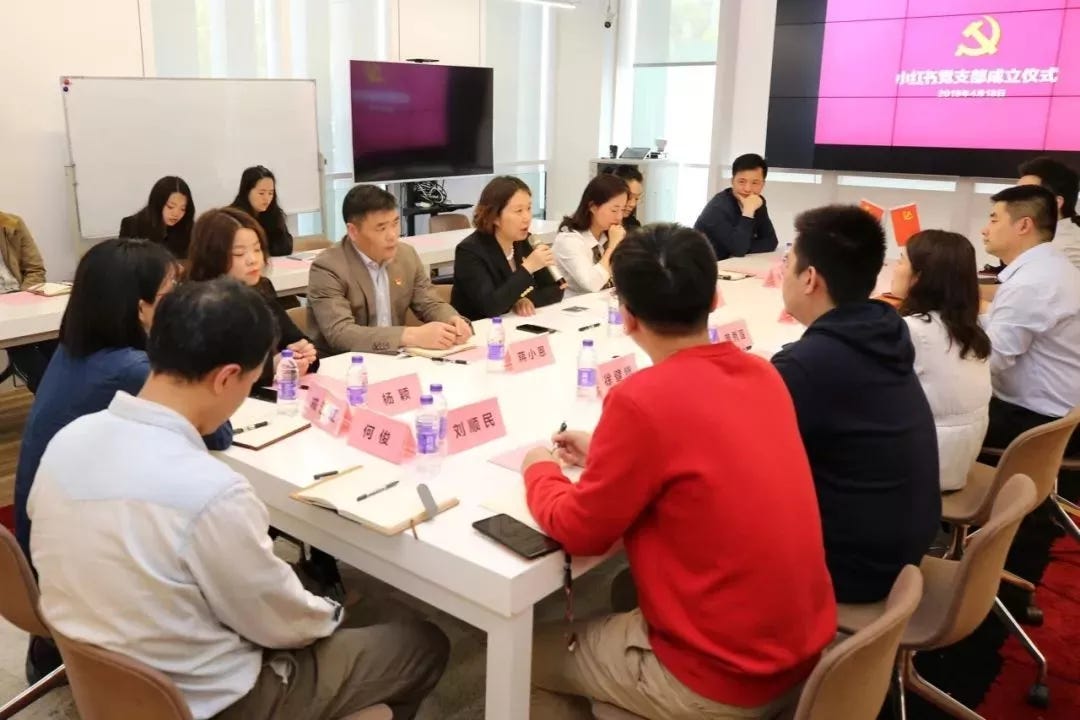
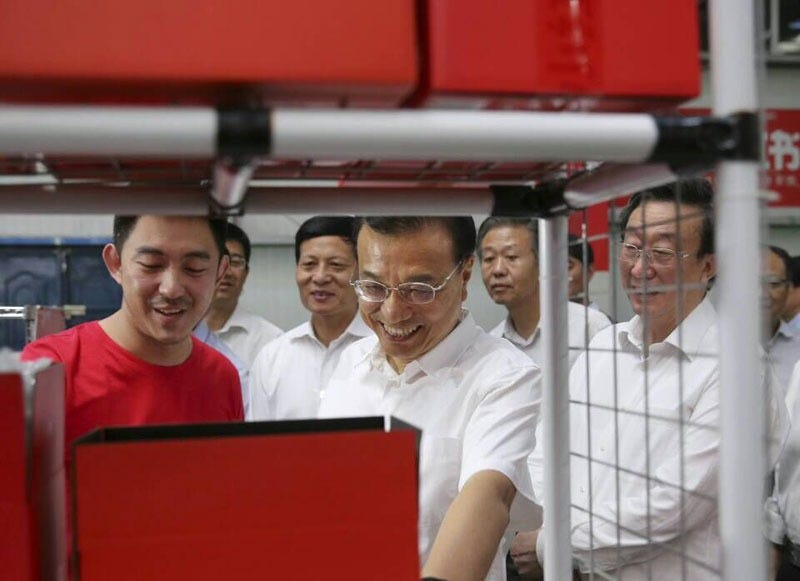
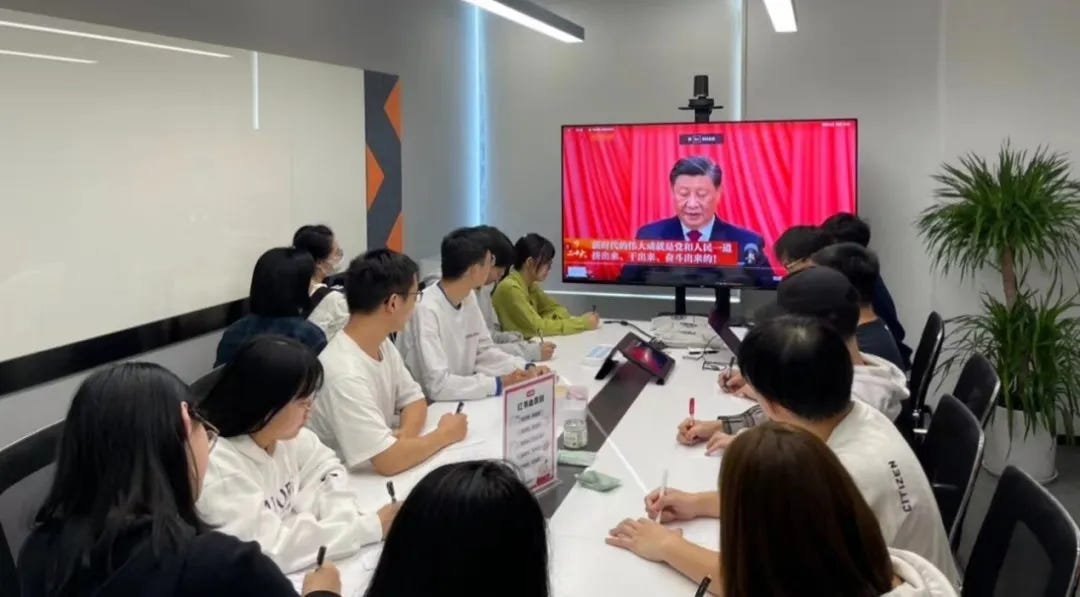
I have been exploring it a bit too. From my posting 2025: Exploring Little Red Book — RedNote/Xiao Hongshu https://gaodawei.wordpress.com/2025/01/18/2025-exploring-little-red-book-rednote/
"Searches in Chinese took me to some interesting places. As a ham radio operator, I looked up postings from Chinese hams including a cute video about learning Morse code and electronics hobbyists at work building stuff. Some Russians are contributing videos to the platform in both fluent Chinese and English. Looking up Mencius/Meng Zi/孟子 I saw an interesting video ascribing the differences in the approaches of Confucius (laying down and explaining moral principles) versus Mencius (same basic ideas but engaging in debates more) to the differences in their times. In Mencius’ era two generations later there was much less social consensus on moral ideas than in Confucius time, so naturally Mencius would be in more debates.
One intriguing posting explains the most common idioms used in the People’s Daily of January 18, 2025. The tags on it include PRC Civil Service Examination so I’d suppose it is a study aid.
I ran it through the ChatGPT4o translation app, adding pinyin after the characters for each idiomatic expression. Students of Chinese might find it interesting. Internet search engines, Chinese websites and now ChatGPT4o (my favorite search engine) have become a great help in figuring out Chinese idiomatic expressions not in my dictionary. Some are neologisms and some are local expressions confined to particular provinces such as Hunan. While the summaries ChatGPT generates are not always completely accurate, it does dig up lots of good sources, so check the summaries against the sources listed, and if not listed query it for sources. Naturally enough if I search ChatGPT in Chinese on Chinese topics I usually do better than if I query it in English. What it generates depends on the sources I find, so if I query a communist ideology topic, I might get a tutorial that seems written for a student at a Party school!"
I don’t necessarily see neither the issue nor the problem. The vast majority of TikTok’s users don’t care the least about Chinese politics, nor about what role the CCP has in their platform.
They want to look at cute animals, dank memes or food. And they resent the fact that American politicians have taken them hostage in some ridiculous neocon pissing contest. (Encouraged by big tech who hates the competition that TikTok brings.)